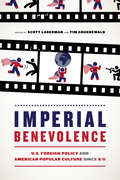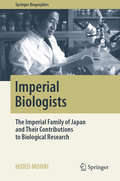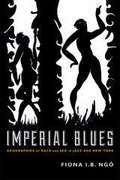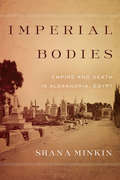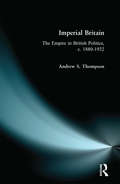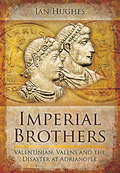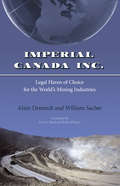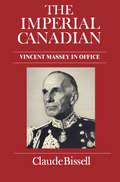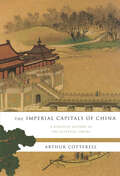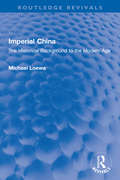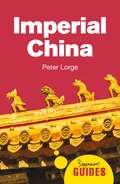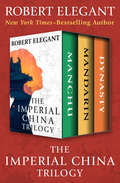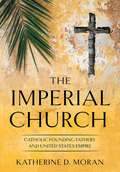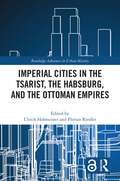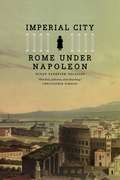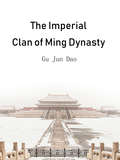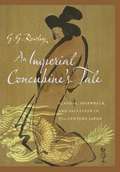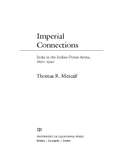- Table View
- List View
Imperial Benevolence: U.S. Foreign Policy and American Popular Culture since 9/11
by Scott LadermanThis is a necessary and urgent read for anyone concerned about the United States' endless wars. Investigating multiple genres of popular culture alongside contemporary U.S. foreign policy and political economy, Imperial Benevolence shows that American popular culture continuously suppresses awareness of U.S. imperialism while assuming American exceptionalism and innocence. This is despite the fact that it is rarely a product of the state. Expertly coordinated essays by prominent historians and media scholars address the ways that movies and television series such as Zero Dark Thirty, The Avengers, and even The Walking Dead, as well as video games such as Call of Duty: Black Ops, have largely presented the United States as a global force for good. Popular culture, with few exceptions, has depicted the U.S. as a reluctant hegemon fiercely defending human rights and protecting or expanding democracy from the barbarians determined to destroy it.
Imperial Biologists: The Imperial Family of Japan and Their Contributions to Biological Research (Springer Biographies)
by Hideo MohriThis book sheds light on a little-known aspect of the Imperial family of Japan: For three generations, members of the family have devoted themselves to biological research. Emperor Showa (Hirohito) was an expert on hydrozoans and slime molds. His son, Emperor Akihito, is an ichthyologist specializing in gobioid fishes, and his research is highly respected in the field. Prince Akishino, Emperor Akihito’s son, is known for his research on giant catfish and the domestication of fowl, while Prince Hitachi, Emperor Akihito’s brother, has conducted research on cancer in animals.The book shows how they became interested in biology, how seriously they were committed to their research, what their main scientific contributions are, and how their achievements are valued by experts at home and abroad.To commemorate the 60-year reign of Emperor Showa and his longtime devotion to biology, the International Prize for Biology was founded in 1985. The prize seeks to recognize and encourage researches in basic biology. A list of winners and a summary of their research are presented in the last part of the book.The author, an eminent biologist who has given lectures to the Imperial Family, explains their research and tells the fascinating story of biology and the Imperial Family of Japan. The book is a valuable resource, not only for biology students and researchers, but also for historians and anyone interested in science and the Royal and Imperial families.
Imperial Blues: Geographies of Race and Sex in Jazz Age New York
by Fiona I. NgôIn this pathbreaking study, Fiona I. B. Ngô examines how geographies of U.S. empire were perceived and enacted during the 1920s and 1930s. Focusing on New York during the height of the Harlem Renaissance, Ngô traces the city's multiple circuits of jazz music and culture. In considering this cosmopolitan milieu, where immigrants from the Philippines, Cuba, Puerto Rico, Mexico, Japan, and China crossed paths with blacks and white "slummers" in dancehalls and speakeasies, she investigates imperialism's profound impact on racial, gendered, and sexual formations. As nightclubs overflowed with the sights and sounds of distant continents, tropical islands, and exotic bodies, tropes of empire provided both artistic possibilities and policing rationales. These renderings naturalized empire and justified expansion, while establishing transnational modes of social control within and outside the imperial city. Ultimately, Ngô argues that domestic structures of race and sex during the 1920s and 1930s cannot be understood apart from the imperial ambitions of the United States.
Imperial Bodies: Empire and Death in Alexandria, Egypt
by Shana MinkinAt the turn of the twentieth century, Alexandria, Egypt, was a bustling transimperial port city, under nominal Ottoman and unofficial British imperial rule. Thousands of European subjects lived, worked, and died there. And when they died, the machinery of empire had to negotiate for space, resources, and control with the nascent national state. Imperial Bodies shows how the mechanisms of death became a tool for exerting both imperial and national governance. Shana Minkin investigates how French and British power asserted itself in Egypt through local consular claims of belonging manifested within the mundane caring for dead bodies. European communities corralled imperial bodies through the bureaucracies and rituals of death—from hospitals, funerals, and cemeteries to autopsies and death registrations. As they did so, imperial consulates pushed against the workings of both the Egyptian state and each other, expanding their governments' material and performative power. Ultimately, this book reveals how European imperial powers did not so much claim Alexandria as their own, as they maneuvered, manipulated, and cajoled their empires into Egypt.
Imperial Boundaries: Cossack Communities and Empire-building in the Age of Peter the Great
by Brian J. BoeckImperial Boundaries is a study of imperial expansion and local transformation on Russia's Don Steppe frontier during the age of Peter the Great. Brian Boeck connects the rivalry of the Russian and Ottoman empires in the northern Black Sea basin to the social history of the Don Cossacks, who were transformed from an open, democratic, multiethnic, male fraternity dedicated to frontier raiding into a closed, ethnic community devoted to defending and advancing the boundaries of the Russian state. He shows how by promoting border patrol, migration control, bureaucratic regulation of cross-border contacts and deportation of dissidents, Peter I destroyed the world of the old steppe and created a new imperial Cossack order in its place. In examining this transformation, Imperial Boundaries addresses key historical issues of imperial expansion, the delegitimization of non-state violence, the construction of borders, and the encroaching boundaries of state authority in the lives of local communities.
Imperial Britain: The Empire in British Politics, c. 1880-1932
by Andrew S. ThompsonThis new study considers the impact of the empire upon modern British political culture. The economic and cultural legacy of empire have received a great deal of attention, but historians have neglected the effects of empire upon the domestic British political scene. Dr Thompson explores economic, demographic, intellectual and military influences and he shows how parliamentary and party opinion interacted with imperial ideas and interests in the country at large. This is a major new book which explores the ideology of key imperial campaigns, and their popular support. It makes a critical contribution to recent debates -- about the importance of empire to the nature and development of British national identities before and after the First World War.
Imperial Brothers: Valentinian, Valens and the Disaster at Adrianople
by Ian HughesThe latest of Ian Hughes' Late Roman biographies here tackles the careers of the brother emperors, Valentinian and Valens. Valentian was selected and proclaimed as emperor in AD 364, when the Empire was still reeling from the disastrous defeat and death in battle of Julian the Apostate (363) and the short reign of his murdered successor, Jovian (364). With the Empire weakened and vulnerable to a victorious Persia in the East and opportunistic Germanic tribes along the Rhine and Danube frontiers, not to mention usurpers and rebellions within, it was not an enviable position. Valentian decided the responsibility had to be divided (not for the first or last time) and appointed his brother as his co-emperor to rule the eastern half of the Empire. Valentinian went on to stabilize the Western Empire, quelling revolt in North Africa, defeating the 'Barbarian Conspiracy' that attacked Britain in 367 and conducting successful wars against the Germanic Alemanni, Quadi and Saxons; he is remembered by History as a strong and successful Emperor. Valens on the other hand, fare less well and is most remembered for his (mis)treatment of the Goths who sought refuge within the Empire's borders from the westward-moving Huns. Valens mishandling of this situation led to the Battle of Adrianople in 378, where he was killed and Rome suffered one of the worst defeats in her long history, often seen as the 'beginning of the end' for the Western Roman empire. Ian Hughes, by tracing the careers of both men in tandem, compares their achievements and analyzes the extent to which they deserve the contrasting reputations handed down by history.
Imperial Canada Inc.
by Alain Deneault William SacherAsks (and answers) the simple question: why is Canada home to more than 70% of the world's mining companies?
The Imperial Canadian
by Claude BissellAristocrat, democrat, diplomat, cultural advocate, anglophile, fiercely proud Canadian--Vincent Massey was a complex, sometimes enigmatic figure. This finely crafted portrait of Massey's middle and later years, drawn extensively from its subject's diaries and papers, recalls a life of deep commitment to the service of his country and its culture.From 1935 to 1946 he served as Canada's high commissioner to London, a role for which he was perfectly suited: his love of English traditions and values was exceeded only by his intense Canadian patriotism. He served well. The courage and generosity of Vincent and Alice Massey made them favourites with Canadian servicemen in Britain during the war years. His familiarity with, and enthusiasm for, all royal ritual was invaluable to the Canadian delegations during the ceremonies surrounding the coronation of George VI. His proud representation of Canada's cultural accomplishments opened British doors to many Canadian artists.The years in London were happy ones for Massey, at home as he was in the country life of the English upper classes. They were followed by a period of frustration. Mackenzie King was minister of external affairs as well as prime minister during Massey's stint as high commissioner, and was therefore Massey's immediate superior. Relations between the two were never very warm--Mackenzie King considered Massey a snob with dangerous ambitions--and when Massey returned to Canada contemplating a political position, possibly a cabinet post, his path was completely blocked.For a time Massey returned to the academic environment he so enjoyed, as chancellor of the University of Toronto. But two of his greatest achievements were still to come. One was the establishment of the royal commission on culture, which bore his name and led ultimately to the creation of the Canada Council. The other was his appointment as governor-general, the first Canadian ever to hold the post.Claude Bissell has followed his award-winning book, The Young Vincent Massey, with another superbly written volume that explores the attitudes, prejudices, commitments, and passions that shaped Massey's life. This is a revealing portrait of a man whose contributions continue to enrich the lives of Canadians.
The Imperial Capitals of China: A Dynastic History of the Celestial Empire
by Arthur CotterellFrom the First Emperor's obsessive u and fatal u attempts to engage the Immortals in 219u210 BC, to the striking creativity that produced the golden age of literature and art in Tang Chang'an, to the culmination of architectural virtuosity seen in The Forbidden City of Yong Lee's Beijing in the fifteenth century, this absorbing new book offers a panoramic sweep of an empire that lasted over two millennia through the imperial cities that were the very foundations of each dynasty. Using original Chinese sources and eye-witness accounts, Arthur Cotterell provides an inside view of the rich array of characters, political and ideological tensions, and technological genius that defined the imperial cities of China, as each in turn is revealed, explored, and celebrated. The oldest continuous civilization in existence today stands to become the most influential, its economy expected to exceed that of the United States by 2020. From the cosmological foundations of the first capital to the politics of empire and cataclysmic civil wars, IMPERIAL CITIES OF CHINA offers a level of insight indispensable for a true understanding of China today.
Imperial China: The Historical Background to the Modern Age (Routledge Revivals)
by Michael LoeweFirst published in 1966, Imperial China sets out to explain China’s past histories to non-specialists. Too often the West has misunderstood the East. China is credited with an excessively long cultural history; with a continuous line of dynastic succession; with uniformly practised institutions; or with intellectual stagnation. Michael Loewe sets out here to dispel some of these misconceptions, and to mark the stages in the evolution of China’s political forms, social organizations and economic progress that can be traced from the days of the first empire (from 221 B.C.) until the dynamic changes of the nineteenth century. He believes that a full understanding of modern China depends on a more than perfunctory glance at her past and has tried to provide the general historical context. The author is well aware that, thanks to the research of the last fifty years, it is now possible and indeed requisite to reach a deeper understanding of China's past. This book will be an essential read for scholars and researchers of Chinese history, Asian history, history in general.
Imperial China: A Beginner's Guide (Beginner's Guides)
by Dr. Peter LorgeIn 221 BCE, the Qin state conquered its neighbours and created the first unified Chinese empire in history. So began the imperial era, where dynasties claiming divine assent ruled for more than 2,000 years. Borders shifted and emperors struggled to exert control over every region of their diverse territories. Elites held that they were inheritors of a rich, pre-imperial culture, while their society produced world-changing inventions such as the compass, printing, gunpowder and the gun. And imperial China itself was altered as it came into contact with others through trade, exploration and war. For anyone curious about this fascinating period, Peter Lorge introduces imperial China&’s major ruling dynasties, religions, arts, thinkers, inventions, military advancements, economic developments and historians.
The Imperial China Trilogy: Manchu, Mandarin, and Dynasty (The Imperial China Trilogy)
by Robert ElegantThe complete New York Times–bestselling trilogy of historical fiction set in China, from an award-winning novelist and Pulitzer Prize finalist in journalism. Spanning over three centuries of Chinese history, New York Times–bestselling and Edgar Award–winning author Robert Elegant takes readers from the opulent courts and complex intrigue of the emperors to the bloody battlefields, and vividly recreates a richly detailed world where the quest for power and pleasure drives men and women to extremes of both loyalty and betrayal. In this special single-volume edition, the novels are presented in chronological historical order. Manchu: In this New York Times bestseller, soldier of fortune Francis Arrowsmith joins a Portuguese expedition to aid the decadent and corrupt Ming dynasty in its fight against the Manchu invaders. He embarks on an epic adventure that will merge his destiny with the fate of China itself. “Does for seventeenth-century China what James Clavell’s Shogun did for sixteenth-century Japan.” —The Christian Science Monitor Mandarin: In nineteenth-century China, imperial rule is crumbling as the Opium Wars and Taiping Rebellion rage. On the streets of Shanghai, a Jewish silk merchant tries to save his Chinese partner from a false accusation and corrupt penal system, while in the imperial palace the “Virtuous Concubine” Yehenala contrives to bear the opium-eating, syphilitic emperor’s only son, thus laying the foundation for her elevation to the pinnacle of power in China as the formidable empress dowager. “Exciting, historically accurate, a good read.” —The New York Times Dynasty: A New York Times bestseller, this epic of love and adultery, money and power, set amid the revolutionary turbulence of twentieth-century China, from the fall of the last emperor to the rise of Mao Tse-tung, follows the Sekloong dynasty of Hong Kong, a trading empire founded by Sir Jonathan, the illegitimate offspring of an Irish adventurer and his Chinese mistress, in all its triumphs, tragedies, betrayals, and bloodshed. “An action-packed novel . . . conjured up with perception and vigor.” —The New York Times Book Review
The Imperial Church: Catholic Founding Fathers and United States Empire (The United States in the World)
by Katherine D. MoranThrough a fascinating discussion of religion's role in the rhetoric of American civilizing empire, The Imperial Church undertakes an exploration of how Catholic mission histories served as a useful reference for Americans narrating US settler colonialism on the North American continent and seeking to extend military, political, and cultural power around the world. Katherine D. Moran traces historical celebrations of Catholic missionary histories in the upper Midwest, Southern California, and the US colonial Philippines to demonstrate the improbable centrality of the Catholic missions to ostensibly Protestant imperial endeavors.Moran shows that, as the United States built its continental and global dominion and an empire of production and commerce in the Gilded Age and Progressive Era, Protestant and Catholic Americans began to celebrate Catholic imperial pasts. She demonstrates that American Protestants joined their Catholic compatriots in speaking with admiration about historical Catholic missionaries: the Jesuit Jacques Marquette in the Midwest, the Franciscan Junípero Serra in Southern California, and the Spanish friars in the Philippines. Comparing them favorably to the Puritans, Pilgrims, and the American Revolutionary generation, commemorators drew these missionaries into a cross-confessional pantheon of US national and imperial founding fathers. In the process, they cast Catholic missionaries as gentle and effective agents of conquest, uplift, and economic growth, arguing that they could serve as both origins and models for an American civilizing empire.The Imperial Church connects Catholic history and the history of US empire by demonstrating that the religious dimensions of American imperial rhetoric have been as cross-confessional as the imperial nation itself.
Imperial Cities in the Tsarist, the Habsburg, and the Ottoman Empires (Routledge Advances in Urban History)
by Ulrich HofmeisterThis book explores the various ways imperial rule constituted and shaped the cities of Eastern Europe until the First World War in the Tsarist, Habsburg, and Ottoman empires. In these three empires, the cities served as hubs of imperial rule: their institutions and infrastructures enabled the diffusion of power within the empires while they also served as the stages where the empire was displayed in monumental architecture and public rituals. To this day, many cities possess a distinctively imperial legacy in the form of material remnants, groups of inhabitants, or memories that shape the perceptions of in- and outsiders. The contributions to this volume address in detail the imperial entanglements of a dozen cities from a long-term perspective reaching back to the eighteenth century. They analyze the imperial capitals as well as smaller cities in the periphery. All of them are "imperial cities" in the sense that they possess traces of imperial rule. By comparing the three empires of Eastern Europe this volume seeks to establish commonalities in this particular geography and highlight trans-imperial exchanges and entanglements. This volume is essential reading to students and scholars alike interested in imperial and colonial history, urban history and European history.
Imperial City: Rome Under Napoleon
by Susan Vandiver NicassioIn 1798, the armies of the French Revolution tried to transform Rome from the capital of the Papal States to a Jacobin Republic. For the next two decades, Rome was the subject of power struggles between the forces of the Empire and the Papacy, while Romans endured the unsuccessful efforts of Napoleon's best and brightest to pull the ancient city into the modern world. Against this historical backdrop, Nicassio weaves together an absorbing social, cultural, and political history of Rome and its people. Based on primary sources and incorporating two centuries of Italian, French, and international research, her work reveals what life was like for Romans in the age of Napoleon. "A remarkable book that wonderfully vivifies an understudied era in the history of Rome. . . . This book will engage anyone interested in early modern cities, the relationship between religion and daily life, and the history of the city of Rome. "--Journal of Modern History "An engaging account of Tosca's Rome. . . . Nicassio provides a fluent introduction to her subject. "--History Today "Meticulously researched, drawing on a host of original manuscripts, memoirs, personal letters, and secondary sources, enabling [Nicassio] to bring her story to life. "--History
The Imperial Clan of Ming Dynasty: Volume 1 (Volume 1 #1)
by Gu JunDaoFrom the end of the Ming Dynasty until the end of the Ming Dynasty, he had become a slave of Jin Shang who starved to death. Where did he get such a good meal from in this apocalyptic era? Plundering of countries... No, this is trade. It was more comfortable being the emperor himself … This sister-in-law Zhang Yan … He had to take good care of her.
The Imperial Clan of Ming Dynasty: Volume 2 (Volume 2 #2)
by Gu JunDaoFrom the end of the Ming Dynasty until the end of the Ming Dynasty, he had become a slave of Jin Shang who starved to death. Where did he get such a good meal from in this apocalyptic era? Plundering of countries... No, this is trade. It was more comfortable being the emperor himself … This sister-in-law Zhang Yan … He had to take good care of her.
The Imperial Clan of Ming Dynasty: Volume 3 (Volume 3 #3)
by Gu JunDaoFrom the end of the Ming Dynasty until the end of the Ming Dynasty, he had become a slave of Jin Shang who starved to death. Where did he get such a good meal from in this apocalyptic era? Plundering of countries... No, this is trade. It was more comfortable being the emperor himself … This sister-in-law Zhang Yan … He had to take good care of her.
The Imperial Clan of Ming Dynasty: Volume 4 (Volume 4 #4)
by Gu JunDaoFrom the end of the Ming Dynasty until the end of the Ming Dynasty, he had become a slave of Jin Shang who starved to death. Where did he get such a good meal from in this apocalyptic era? Plundering of countries... No, this is trade. It was more comfortable being the emperor himself … This sister-in-law Zhang Yan … He had to take good care of her.
The Imperial Clan of Ming Dynasty: Volume 5 (Volume 5 #5)
by Gu JunDaoFrom the end of the Ming Dynasty until the end of the Ming Dynasty, he had become a slave of Jin Shang who starved to death. Where did he get such a good meal from in this apocalyptic era? Plundering of countries... No, this is trade. It was more comfortable being the emperor himself … This sister-in-law Zhang Yan … He had to take good care of her.
The Imperial Clan of Ming Dynasty: Volume 6 (Volume 6 #6)
by Gu JunDaoFrom the end of the Ming Dynasty until the end of the Ming Dynasty, he had become a slave of Jin Shang who starved to death. Where did he get such a good meal from in this apocalyptic era? Plundering of countries... No, this is trade. It was more comfortable being the emperor himself … This sister-in-law Zhang Yan … He had to take good care of her.
An Imperial Concubine's Tale: Scandal, Shipwreck, and Salvation in Seventeenth-Century Japan
by G. G. RowleyJapan in the early seventeenth century was a wild place. Serial killers stalked the streets of Kyoto at night, while noblemen and women mingled freely at the imperial palace, drinking saké and watching kabuki dancing in the presence of the emperor's principal consort. Among these noblewomen was an imperial concubine named Nakanoin Nakako, who in 1609 became embroiled in a sex scandal involving both courtiers and young women in the emperor's service. As punishment, Nakako was banished to an island in the Pacific Ocean, but she never reached her destination. Instead, she was shipwrecked and spent fourteen years in a remote village on the Izu Peninsula before she was finally allowed to return to Kyoto. In 1641, Nakako began a new adventure: she entered a convent and became a Buddhist nun.Recounting the remarkable story of this resilient woman and her war-torn world, G. G. Rowley investigates aristocratic family archives, village storehouses, and the records of imperial convents. She follows the banished concubine as she endures rural exile, receives an unexpected reprieve, and rediscovers herself as the abbess of a nunnery. While unraveling Nakako's unusual tale, Rowley also reveals the little-known lives of samurai women who sacrificed themselves on the fringes of the great battles that brought an end to more than a century of civil war. Written with keen insight and genuine affection, An Imperial Concubine's Tale tells the true story of a woman's extraordinary life in seventeenth-century Japan.
An Imperial Concubine's Tale
by G. G. RowleyJapan in the early seventeenth century was a wild place. Serial killers stalked the streets of Kyoto at night, while noblemen and women mingled freely at the imperial palace, drinking saké and watching kabuki dancing in the presence of the emperor's principal consort. Among these noblewomen was an imperial concubine named Nakanoin Nakako, who in 1609 became embroiled in a sex scandal involving both courtiers and young women in the emperor's service. As punishment, Nakako was banished to an island in the Pacific Ocean, but she never reached her destination. Instead, she was shipwrecked and spent fourteen years in a remote village on the Izu Peninsula, before being set free in an amnesty. Returning to Kyoto, Nakako began a new adventure: she entered a convent and became a Buddhist nun.Recounting the remarkable story of this resilient woman and the war-torn world in which she lived, G. G. Rowley investigates aristocratic family archives, village storehouses, and the records of imperial convents to re-create Nakako's life from beginning to end. She follows the banished concubine as she endures rural exile, receives an unexpected reprieve, and rediscovers herself as the abbess of a nunnery. As she unravels Nakako's unusual tale, Rowley also profiles the little-known lives of samurai women who sacrificed themselves on the fringes of the great battles that brought an end to more than a century of civil war. Written with keen insight and genuine affection, An Imperial Concubine's Tale tells the true story of a woman's extraordinary life in seventeenth-century Japan.
Imperial Connections
by Thomas R. MetcalfAn innovative remapping of empire, Imperial Connections offers a broad-ranging view of the workings of the British Empire in the period when the India of the Raj stood at the center of a newly globalized system of trade, investment, and migration. Thomas R. Metcalf argues that India itself became a nexus of imperial power that made possible British conquest, control, and governance across a wide arc of territory stretching from Africa to eastern Asia. His book, offering a new perspective on how imperialism operates, emphasizes transcolonial interactions and webs of influence that advanced the interests of colonial India and Britain alike. Metcalf examines such topics as law codes and administrative forms as they were shaped by Indian precedents; the Indian Army's role in securing Malaya, Africa, and Mesopotamia for the empire; the employment of Indians, especially Sikhs, in colonial policing; and the transformation of East Africa into what was almost a province of India through the construction of the Uganda railway. He concludes with a look at the decline of this Indian Ocean system after 1920 and considers how far India's participation in it opened opportunities for Indians to be a colonizing as well as a colonized people.
